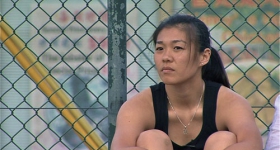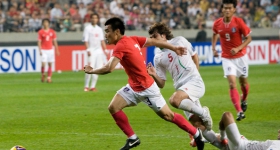My friend Benny Evangelista is a native San Franciscan, a long-time Giants fan, and a certified baseball fanatic.
So he was naturally excited about the Giants making it to the World Series.
But the first Facebook status update he posted, as he waited for the start of Game 1 at AT&T Park in San Francisco, underscored the even bigger significance of the championship for him and the rest of Filipino America.
“Here at AT&T Park to watch Tim Lincecum be the first Filipino American pitcher to start and win a World Series game,” Benny, a veteran reporter with the San Francisco Chronicle, wrote.
For Bay Area Pinoys, the unexpected and dramatic triumph of the San Francisco Giants became even sweeter because one of the stars of the show was Filipino American.
I wrote about Lincecum in April when the baseball season was just beginning, and when few imagined the Giants becoming champions.
Like other articles on Lincecum, I got one thing wrong: Lincecum is not the son of a daughter of a Pinoy immigrant, which would make him a second generation FilAm.
He’s actually the son of a great-granddaughter of a Filipino immigrant. That makes him a fourth generation Filipino American.
That’s not all, according to Dawn Mabalon and the Filipino American National Historical Society.
“What I found was that not only is Lincecum Filipino American,” Mabalon wrote in a blog post, “his family history IS Filipino American history!”
Lincecum’s mother, Rebecca Asis, was the daughter of Philomena Marcigan Asis and Balleriano Asis, descendants of migrant farm laborers -- known as sacadas -- who moved to Hawaii during the great migration that began in the 1906, when the Philippines was an American colony.
Lincecum’s great-grandmother Alberta Alcoy was a child from Cebu when she moved to Hawaii with her mother, who was a widow at the turn of the 20th century. She later married Genaro Asis who led the historic 1919 plantation strike in Hawaii. One of his great-grandfathers came from Batangas and another great-grandmother hailed from Siquijor. Both also endured the historic labor action on the island.
One of his uncles, Bob Asis, was known to have been part of the group that raided the Japanese prisoner of war camp in Cabanatuan. And legend has it that he even blasted the gate open during the raid that freed American prisoners and won a Purple Heart for his role.
From there, Lincecum’s family journey continued to Stockton where they helped create what became a vibrant center of the Filipino American community, and to the Seattle area in Washington State where Lincecum grew up.
On Monday, their journey reached a high point in San Francisco, when the Giants, playing Game 5 in Texas, finally won their first championship since moving to the Bay Area more than half a century ago.
It’s a story that Lincecum has apparently embraced. For his Filipino-ness is not just some minor factoid in his biography. In fact, as I recalled in the April column, it once even got him in trouble.
It happened during a 2007 game against the Chicago Cubs when Lincecum created a stir by appearing to be showing off and acting childish. Lincecum later apologized, and revealed the reason: His grandfather Balleriano had just died.
“I had a lot of stuff in my head,” he was quoted as saying in a report in the Sacramento Bee. He mentioned his lolo whose first name he did not know how to spell.
“I just called him Grandpa Asis, because that's his last name,” Lincecum said. “It's Filipino… Out there, I was thinking about him. I was thinking of past stuff as well as using him to help me… A lot of people do that -- they look to God and relatives that have passed away. They look to them to help them get through stuff.”
Lincecum continued, “I guess I used him like that ... and it was great. It's sad to see him go, and it's kind of tough to deal with, but on the field I'm just trying to be as focused on the game as possible.”
Mabalon began looking deeper into his story partly after becoming incensed by comments on the Web dismissing Lincecum as not really Pinoy, because his dad is Caucasian.
“My god, if we rated Filipino-ness on blood quantum then we had a Spanish national hero, and Spanish president of the first Commonwealth, since [Quezon] was as much a Spaniard, and Rizal was as much Spanish/Chinese, as they were ‘pure’ Filipino,” Dawn told me. “When interviewed, he doesn't say, ‘I'm half.’ He says, ‘I'm Filipino American.’”
In Seattle, Washington, Dr. Fred Cordova, the guru of Filipino American historians, who knows Lincecum’s family, agreed.
“As long as he’s got a drop of bagoong in him, he’s ours,” Dr. Cordova told me. “Our Filipino American history is very strong in Tim Lincecum’s blood.”
My friend Benny certainly sees the man who pitched the winning game on Monday as a fellow Pinoy.
“I am especially proud that the Giants ace pitcher is Tim Lincecum,” he told me. “I'd be rooting for him anyway, but the fact that he's part Filipino fills me with even more pride. It gives me an even deeper connection with the team.”
Ironically, his own love for baseball came from the Philippines where his father Benny Sr. played as a kid in San Antonio, Zambales before moving to America to work as a baker for the US Navy.
“Baseball was the topic that bonded us as father and son. When he was away from home for weeks or even months at a time on his troop ship, our only communication was by mail, so he would ask me about how the Giants were doing and I'd write pages and pages of information about how the Giants were doing.”
It’s a love he passed on to his son and daughter who are also Giants fans, as well as his late wife Alice. However, this love for San Francisco baseball has come with a price -- the Giants, after all, have in the past repeatedly come close to winning only to see victory slip away.
“We've had so many close calls and disappointments through the years,” Benny said Monday afternoon before the final game. “So if they are able to win it all this year, I will be floating on a cloud.”
Monday night, Benny, Dawn, Mang Fred, and the rest of Filipino America were soaring.
Originally published as:
"In SF Giants Star, the Story of Filipino America"
Copyright 2010 by Benjamin Pimentel. On Twitter @KuwentoPimentel









Comments